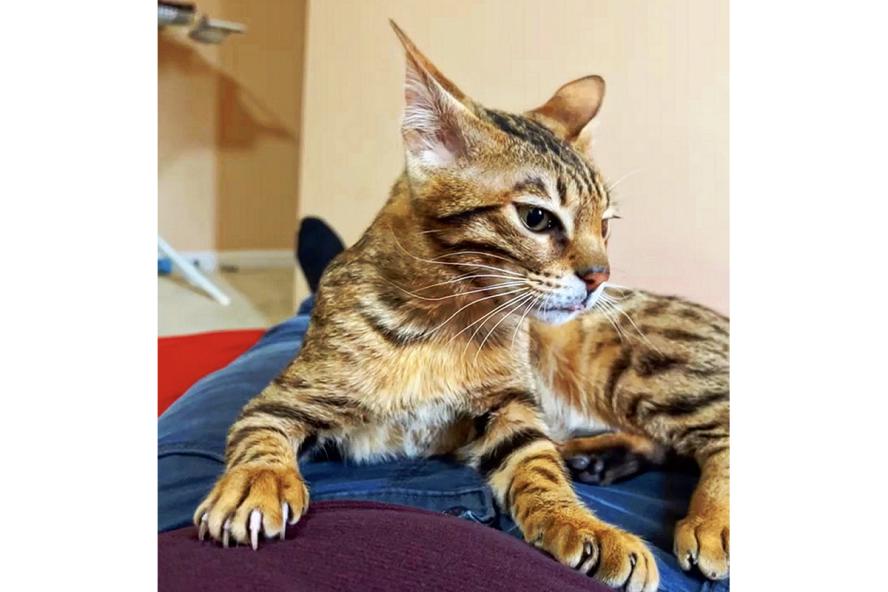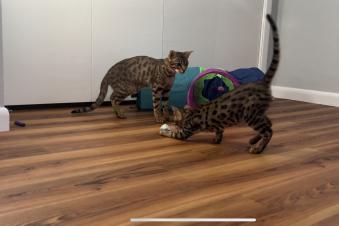-
About
- Leadership & Faculty
- News & Events
-
Academics
- Graduate
- Advanced Clinical Training
- Continuing Education
-
Student Life
-
Research
-
Hospitals & Clinics
- Emergency Care
- Hospital Services
-
Community Outreach
- Volunteer
Loki Defeats Panleukopenia
Kitten survives nearly five weeks in hospital after numerous complications from rare viral disease

Named after a Marvel Comics character known as the God of Mischief, Loki became an instant object of adoration by Mo and Aleksa Aldarawcheh as soon as they adopted him from a breeder. A Savannah cat, the young feline had been with the family for just a week when he started showing troubling symptoms—he was extremely sleepy, had difficulty breathing, he was vomiting and had no appetite.
Mo and Aleksa brought Loki to the Henry and Lois Foster Hospital for Small Animals at Cummings School of Veterinary Medicine at Tufts University for care, where Emergency Medicine and Critical Care residents Drs. Jessica Eisenbarth (she/her) and Alexandra Allen (she/her), assisted by fellow ECC resident Dr. Kristina Manson. “He came in and we quickly ran blood work and diagnosed him with panleukopenia,” says Eisenbarth.
According to the American Veterinary Medical Association, feline panleukopenia was the leading cause of death in cats before the availability and use of effective vaccines. Caused by the feline parvovirus, the highly contagious viral disease most severely affects kittens, infecting and killing cells that are rapidly growing and dividing.
“They knew within an hour that he had panleukopenia, told us that he needed to stay overnight and explained how sick he was,” Mo explains. “They said he had a slim chance of survival, like 10 percent.”
Loki showed us that he was a fighter despite encountering many obstacles throughout his hospitalization. Watching him overcome each and survive gave us hope and reinforced why we do what we do.
Dr. Alexandra Allen
Aleksa adds, “He was only three months old but we instantly fell in love with him and we were going to do anything it took to take care of him.”
“The owners were very dedicated to him and just wanted to keep him going, but he had to have multiple surgeries for complications from panleukopenia, and every step of the way, he kept fighting,” Eisenbarth contends. “It was a difficult case because he would show some improvements, and the next day something would happen and he would need a surgery or procedure.”
Aleksa laments, “It seemed like every time we would get some good news, it would change overnight. It was a roller coaster for quite a while.”
Loki’s extended stay was difficult for Mo and Aleksa to endure, but the consistent communication they received from the doctors helped them through it. “He had a blood transfusion and a plasma transfusion. He got pneumonia and had stomach surgery and a feeding tube,” Mo says. “He endured all these different complications, and with each step we were assured that he wasn’t suffering, so that gave us some confidence to keep trying to save him.”
“The doctors provided us with their emails, so if we got anxious about an update following a procedure, we could reach out,” Aleksa says. “And the staff bonded with him as well because they took care of him for so long. They were also great about sending pictures of Loki, which we really appreciated. We could tell that when he had a little bit of light in his eyes that he was doing better.”
Eventually, Loki improved. “Slowly but surely, he started to get stronger and turn the corner,” Eisenbarth says. “He is really special. The prognosis of him pulling through and going home wavered at times, but both the nurses and doctors that worked directly with him and his owners maintained hope.”
Allen agrees. “Loki showed us that he was a fighter despite encountering many obstacles throughout his hospitalization,” she adds. “Watching him overcome each and survive gave us hope and reinforced why we do what we do.”
The hospital staff developed a strong affection for him. “Some crowdfunding was done to help him out and two of our interns donated their Travis Fund money (funds donated to Cummings School to assist students) to help maintain his care,” Eisenbarth says. “And a faculty member made stickers with Loki’s face on them and passed them out, so we all have Loki stickers.”
“After we brought him back for a follow-up, they gave us a sticker of Loki,” Aleksa laughs. “Everybody there seemed to know his name.”
Loki’s transition back home has been steady, as Mo and Aleksa were shown how to feed him through a feeding tube and change the dressings on his wounds. “They explained everything really well and he’s doing well now,” Aleksa shares.
Another member of the household was also happy to have some company, their second Savannah cat, Thor. Together, these felines named after Marvel Comics characters will conquer their own tiny universe, one day at a time.
Department:
Foster Hospital for Small Animals
